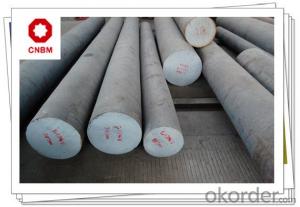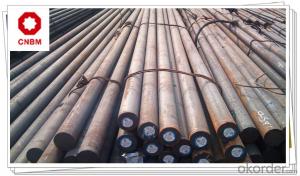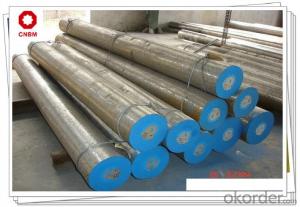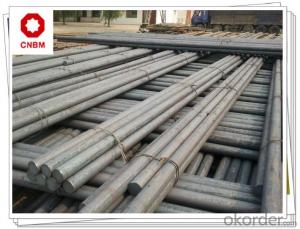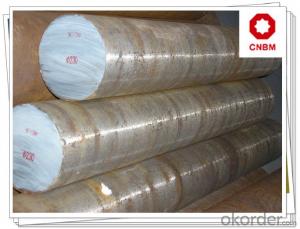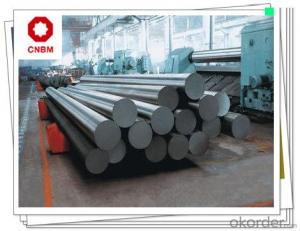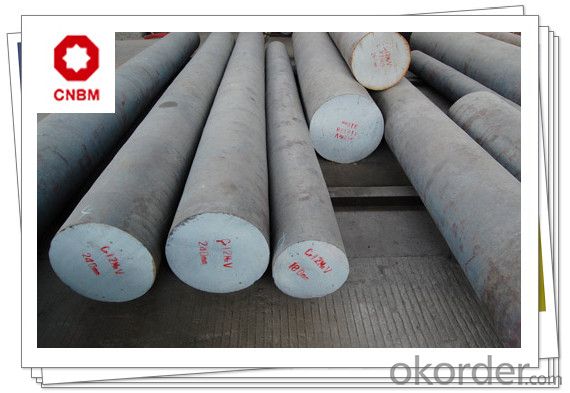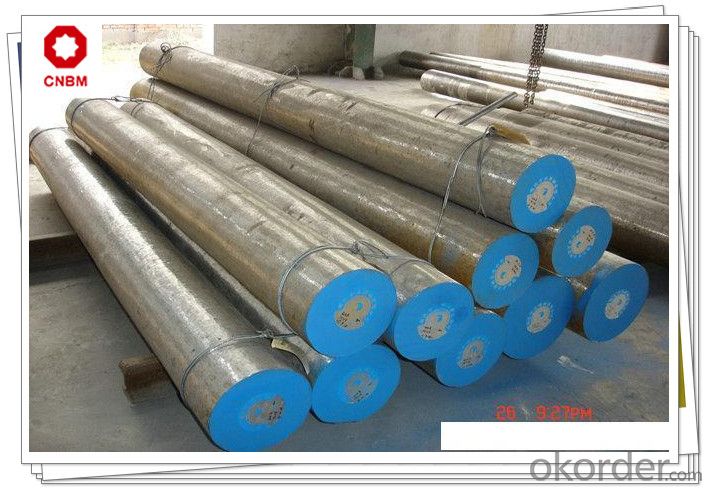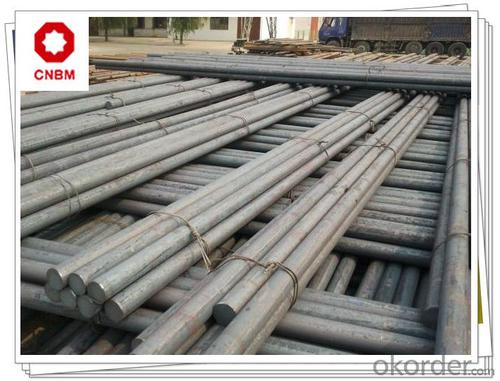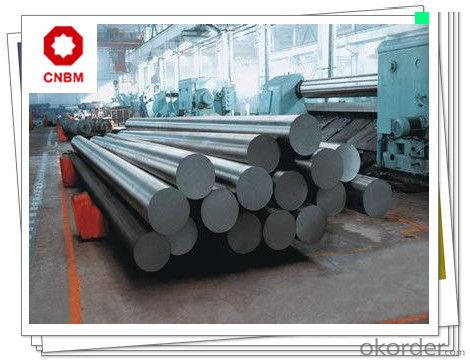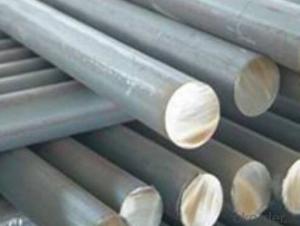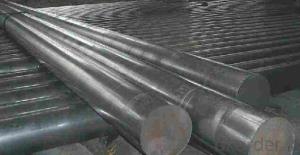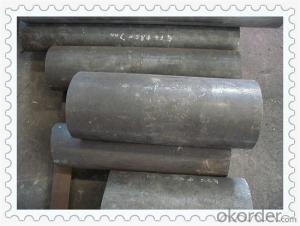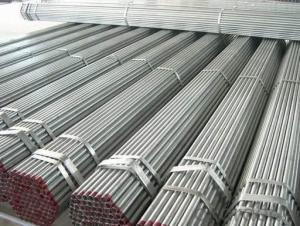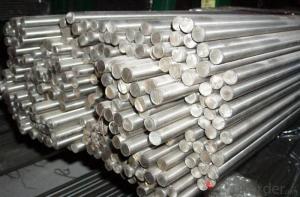aisi 4140 carbon alloy steel round bars
- Loading Port:
- Shanghai
- Payment Terms:
- TT OR LC
- Min Order Qty:
- 30 m.t.
- Supply Capability:
- 120000 m.t./month
OKorder Service Pledge
OKorder Financial Service
You Might Also Like
aisi 4140 Carbon Alloy Steel Round Bars
Specification
1, Diameter: 8mm-250mm rounds
5mm-9mm rods
2, Length: 2m, 3m, 5.8m, 6m or customized
3, Standard: GB, ASTM, AISI, SAE, DIN, JIS, EN
OEM technology - send detailed technical parameters for accurate quotation.
2, Produce Process: smelt iron - EAF smelt billet - ESR smelt billet -
hot rolled or forged to get the steel round bar and plate
3, Heat Treatment: annealing, normalizing, tempering, quenching
4, Surface Treatment: Black, Polished, Galvanized
5, Quality Assurance: We accept third party inspection for all orders.
You can ask testing organizations such as SGS, BV, etc. to test our products before shipping.
Equivalent grades
| GB | DIN | AISI | JIS |
| 42CrMo | 1.7225 | 4140 | SCM440 |
Chemical Composition
| C | Si | Mn | Cr | Mo | P | S |
| 0.38-0.43 | 0.40max | 0.60-0.90 | 0.90-1.20 | 0.15-0.30 | ≤0.035 | ≤0.035 |
Products Show
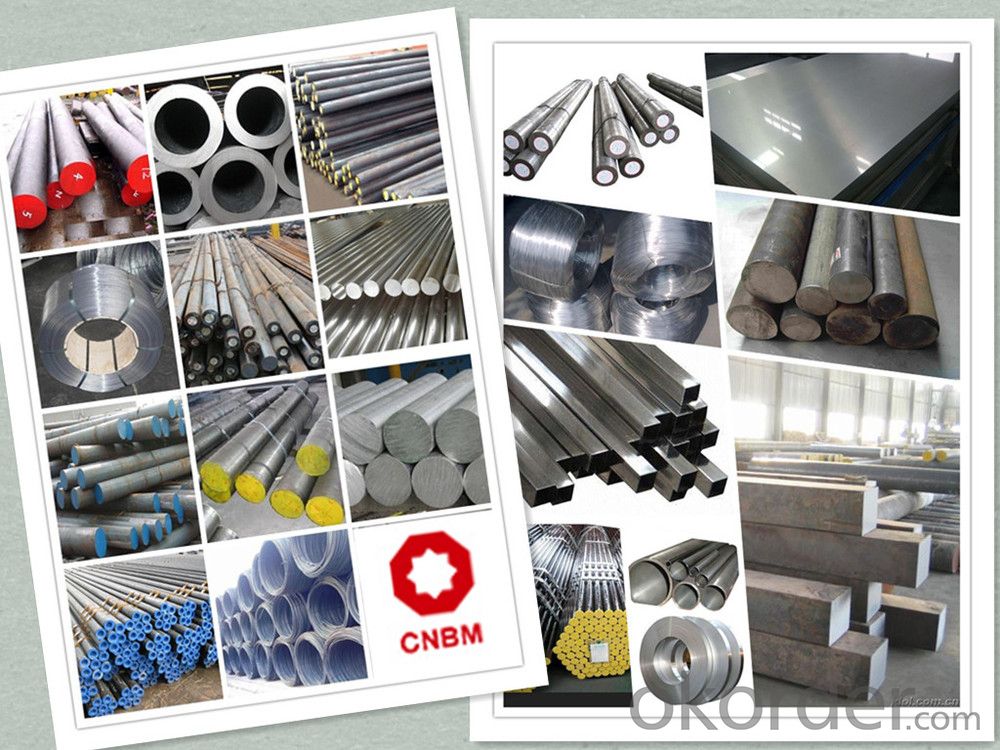
Product Overviews
| Product Name | Typical Grades | Diameter(mm) | Standard adopted |
| Carbon Steel | 20 (1020/S20C/C22) | Ø16-Ø300 |
GB/SAE/JIS/DIN
|
| 40 (1040/S40C/C40) | |||
| 45 (1045/S45C/C45) | |||
| Bearing Steel | GCr9 (51100/SUJ1) | Ø12-Ø250 | |
| GCr15 (52100/SUJ2/100Gr6) | |||
| GCr9SiMn (A485-Gr.1/SUJ3) | |||
Cr-Mo Steel | 20Cr (5120/SCr420H/20Cr4) | Ø12-Ø250 | |
| 40Cr (5140/SCr440/41Cr4) | |||
| 42CrMo(4140/SCM440/42CrMo4) | |||
| Gear Steel | 20CrNiMo | Ø16-Ø600 | |
| 20CrMn(5115/SMnC420/20MnCr5) | |||
| 20CrNiMo(8620/SNCM220/20CrMiMo2) |
Work Shop
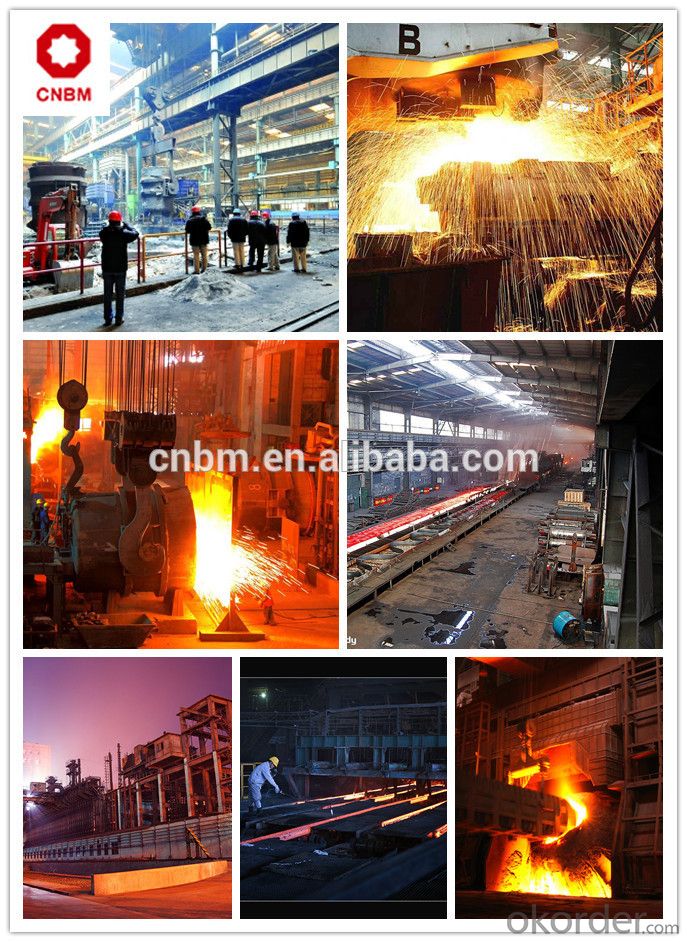
Company Information
CNBM International Corporation is the most important trading platform of CNBM group.
Whith its advantages, CNBM International are mainly concentrate on Cement, Glass, Iron and Steel, Ceramics industries and devotes herself for supplying high qulity series of refractories as well as technical consultancies and logistics solutions.

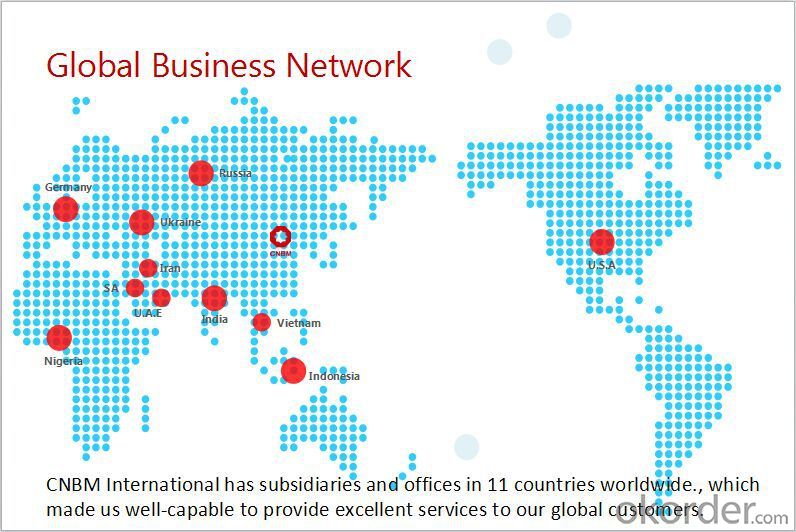
FAQ
1, Your advantages?
professional products inquiry, products knowledge train (for agents), smooth goods delivery, excellent customer solution proposale
2, Test & Certificate?
SGS test is available, customer inspection before shipping is welcome, third party inspection is no problem
3, Factory or Trading Company?
CNBM is a trading company but we have so many protocol factories and CNBM works as a trading department of these factories. Also CNBM is the holding company of many factories.
4, Payment Terms?
30% TT as deposit and 70% before delivery.
Irrevocable L/C at sight.
5, Trading Terms?
EXW, FOB, CIF, FFR, CNF
6, After-sale Service?
CNBM provides the services and support you need for every step of our cooperation. We're the business partner you can trust.
For any problem, please kindly contact us at any your convenient time.
We'll reply you in our first priority within 24 hours.
Packaging & Delivery
1, Packaging: seaworthy package or as required
2, Delivery: 35-45 days or based on quantity
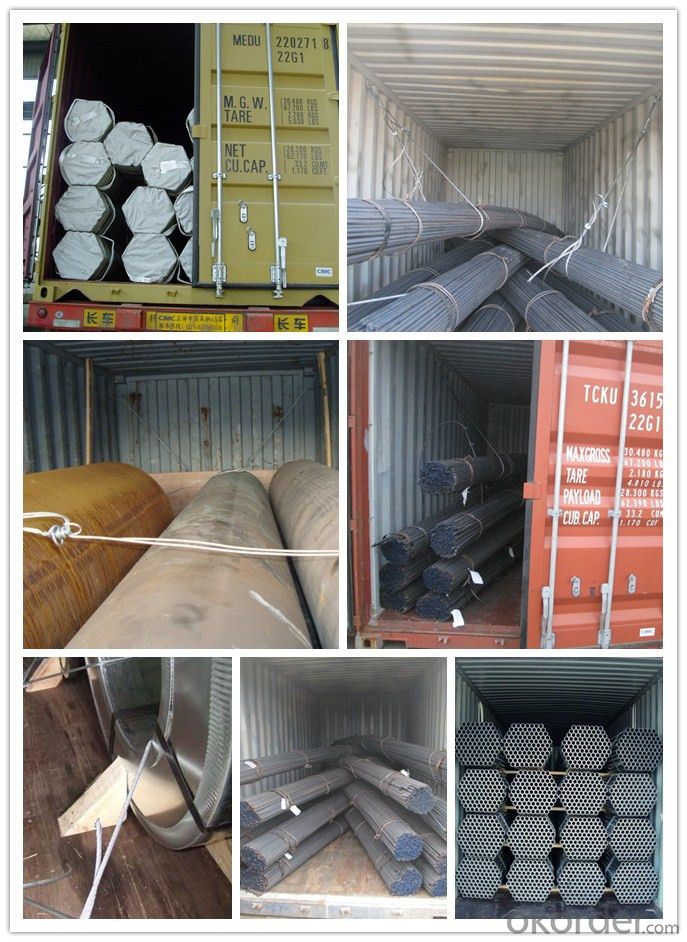
- Q: Are steel round bars suitable for marine applications?
- Yes, steel round bars are suitable for marine applications. Steel is known for its strength, durability, and corrosion resistance, making it a popular choice for various marine applications. Steel round bars are commonly used in the construction of marine structures, such as shipbuilding, offshore platforms, and marine equipment. The high tensile strength of steel allows it to withstand the harsh conditions of the marine environment, including the corrosive effects of saltwater. Additionally, steel can be easily fabricated and welded, making it a versatile material for marine applications. However, it is important to consider the specific requirements of the marine application and choose the appropriate type of steel round bar. Duplex stainless steel, for example, offers superior corrosion resistance compared to standard carbon steels and is often preferred for marine applications. It is also crucial to apply proper maintenance and protective coatings to ensure the longevity and performance of steel round bars in marine environments. Overall, steel round bars are a suitable choice for marine applications due to their strength, durability, and corrosion resistance. However, it is essential to select the right type of steel and implement proper maintenance practices to ensure optimal performance in the marine environment.
- Q: What are the advantages of using steel round bars compared to other materials?
- Steel round bars offer several advantages over other materials. Firstly, steel is known for its exceptional strength and durability. With its high tensile strength, steel can withstand heavy loads and pressure without deforming or breaking. This makes steel round bars perfect for applications that require structural support or load-bearing capabilities. Furthermore, steel is a highly versatile material that can be easily shaped and molded into various forms, including round bars. This flexibility in design makes steel round bars suitable for a wide range of applications, whether it be in construction, manufacturing, or the automotive industry. They can be customized to meet specific requirements. In addition to its strength and versatility, steel is also corrosion-resistant. It naturally resists rust and other forms of corrosion, making it ideal for both indoor and outdoor use. Steel round bars can withstand exposure to moisture, chemicals, and harsh environmental conditions, ensuring their longevity. Another advantage of steel round bars is their cost-effectiveness. Although the initial cost of steel may be higher than that of other materials, its long-term benefits and durability make it a cost-effective choice. Steel round bars require minimal maintenance and can last for decades without the need for replacement or repair, resulting in significant cost savings over time. Moreover, steel is a sustainable material. It is 100% recyclable and can be reused multiple times without losing its properties or quality. By choosing steel round bars, one contributes to reducing waste and conserving resources, making it an environmentally friendly choice. In conclusion, the strengths of steel round bars compared to other materials lie in their strength, versatility, corrosion resistance, cost-effectiveness, and sustainability. These qualities make steel round bars the preferred choice for various applications, guaranteeing long-lasting and reliable performance.
- Q: What is the difference between a rough turned and a centerless ground steel round bar?
- A rough turned steel round bar is a steel bar that has been machined to a standard size and shape using a lathe or turning machine. This involves removing excess material from the bar's surface to achieve the desired diameter and smoothness. The resulting rough turned bar may still have minor imperfections or variations in size and surface finish. On the contrary, a centerless ground steel round bar undergoes a different manufacturing process. This process involves feeding the steel bar through two rotating wheels - a grinding wheel and a regulating wheel. The grinding wheel removes material from the bar's surface to achieve a precise diameter, while the regulating wheel controls the bar's feed rate. This process ensures precise tolerances, an excellent surface finish, and a consistent diameter along the entire length of the bar. In conclusion, the primary distinction between a rough turned and a centerless ground steel round bar lies in the manufacturing process and resulting quality. While a rough turned bar is machined to a standard size and shape with some imperfections, a centerless ground bar undergoes a more precise grinding process to achieve a highly accurate diameter, excellent surface finish, and consistent dimensions throughout the bar.
- Q: Can steel round bars be hardened?
- Yes, steel round bars can be hardened. Hardening is a process in which the steel is heated to a specific temperature and then rapidly cooled, commonly known as quenching. This rapid cooling causes the steel to undergo a transformation, resulting in increased hardness and strength. The hardening process is typically followed by tempering, which involves reheating the hardened steel to a lower temperature to reduce its brittleness and further enhance its toughness. Hardening is commonly used in the manufacturing of tools, machine parts, and other applications where high strength and durability are required.
- Q: What are the different types of steel round bar surface treatments for improved hardness?
- There are several different types of steel round bar surface treatments that can be used to improve hardness. These treatments are designed to enhance the strength and durability of the steel, making it more resistant to wear and tear. Some of the common surface treatments for improved hardness include: 1. Heat Treatment: This is a widely used method where the steel round bar is heated to a specific temperature and then cooled rapidly to alter its microstructure. This process can increase the hardness of the steel, making it suitable for applications that require high strength and toughness. 2. Nitriding: Nitriding involves exposing the steel round bar to a nitrogen-rich environment at high temperatures. This treatment forms a hard layer of nitrides on the surface of the steel, enhancing its hardness, wear resistance, and fatigue life. 3. Carbonitriding: Similar to nitriding, carbonitriding involves introducing both carbon and nitrogen into the steel round bar's surface. This treatment creates a hard and wear-resistant layer while maintaining a tough core. Carbonitriding is commonly used for applications that require a combination of hardness and toughness. 4. Induction Hardening: In this process, the steel round bar is heated through electromagnetic induction and then rapidly cooled. This treatment selectively hardens the surface of the steel, leaving the core relatively unaffected. Induction hardening is effective in improving the hardness and wear resistance of specific areas, such as gears or shafts. 5. Chroming: Chrome plating is a surface treatment method where a layer of chromium is deposited onto the steel round bar's surface. This treatment provides excellent hardness, corrosion resistance, and wear resistance. Chroming is commonly used for applications exposed to harsh environments or for parts that require a smooth and hard surface. 6. Shot Peening: Shot peening involves bombarding the steel round bar's surface with tiny metal or ceramic particles at high speed. This treatment induces compressive stress, which improves the material's hardness, fatigue strength, and resistance to crack initiation and propagation. It is important to note that the choice of surface treatment for improved hardness depends on the specific requirements of the application, the type of steel used, and the desired mechanical properties. Consulting with a materials engineer or specialist is recommended to determine the most suitable treatment for a particular steel round bar.
- Q: What is the minimum tensile strength of steel round bars?
- The minimum tensile strength of steel round bars can vary depending on the specific grade or type of steel being used. However, common steel grades typically have a minimum tensile strength of around 400 MPa (megapascals) or 58,000 PSI (pounds per square inch).
- Q: What is the difference between a peeled and a polished steel round bar?
- A peeled steel round bar and a polished steel round bar are two different types of steel bars with distinct characteristics and applications. A peeled steel round bar is a steel bar that has undergone a peeling process. During this process, the outer surface of the bar is removed, resulting in a smooth and clean finish. The peeling process removes any imperfections or scale on the surface of the bar, improving its appearance and quality. This makes peeled steel round bars ideal for applications where a smooth surface is required, such as in the manufacturing of precision components, shafts, or spindles. The process of peeling also enhances the mechanical properties of the bar, improving its strength and toughness. On the other hand, a polished steel round bar is a steel bar that has undergone a polishing process. In this process, the surface of the bar is polished using abrasive materials to create a shiny and reflective finish. The polishing process removes any surface imperfections, scratches, or dullness, resulting in a visually appealing and aesthetically pleasing appearance. Polished steel round bars are often used in decorative applications, architectural designs, or in industries where a visually attractive finish is desired, such as in furniture manufacturing or automotive accessories. In summary, the main difference between a peeled and a polished steel round bar is the process they undergo and the intended applications. A peeled steel round bar is processed to remove imperfections and improve mechanical properties, making it suitable for precision components, while a polished steel round bar is processed to create a shiny and reflective surface, making it ideal for decorative or visually appealing applications.
- Q: What are the different types of steel round bar alloys for improved machinability?
- There are several types of steel round bar alloys that are specifically designed to improve machinability. These alloys are chosen for their ability to be easily shaped, cut, and drilled, which is crucial in various machining applications. Some of the commonly used steel round bar alloys for improved machinability include: 1. 12L14 Steel: This alloy contains added lead, which enhances its machinability. The presence of lead lubricates the cutting tool, reduces friction, and improves chip formation during the machining process. 2. 1215 Steel: Similar to 12L14, 1215 steel also contains added lead, which provides excellent machinability. This alloy is known for its high cutting speeds, smooth surface finish, and improved chip control. 3. 4140 Steel: Although not specifically designed for machinability, 4140 steel is known for its excellent overall machining properties. With proper heat treatment, this alloy offers good strength, toughness, and wear resistance while still maintaining a reasonable level of machinability. 4. 1018 Steel: This low carbon steel alloy is widely used for its excellent machinability. It is easy to cut, drill, and shape, making it suitable for a variety of machining operations. However, it may have lower strength compared to some other alloys. 5. 8620 Steel: This alloy is specifically designed for case hardening, but it also offers good machinability. 8620 steel can be easily machined, providing high surface finish and dimensional accuracy. 6. 416 Stainless Steel: This stainless steel alloy provides good machinability due to its sulfur content. It is used in applications where corrosion resistance is required along with improved machinability. These are just a few examples of steel round bar alloys that are chosen for their enhanced machinability. The selection of the appropriate alloy depends on the specific machining requirements and the desired properties in the final product.
- Q: What are the advantages of using nickel-iron alloy steel round bars?
- Nickel-iron alloy steel round bars offer numerous benefits. Firstly, they possess outstanding resistance to corrosion and oxidation, making them highly suitable for environments with moisture, chemicals, or high temperatures. This ensures their structural integrity and durability, reducing the need for frequent replacements or repairs. Secondly, these round bars exhibit excellent mechanical properties, including high strength, toughness, and hardness. This makes them ideal for heavy-duty applications in industries such as construction, manufacturing, and engineering. Additionally, nickel-iron alloy steel maintains its shape and dimensions even at extreme temperatures, thanks to its good thermal stability and resistance to thermal expansion. This reliability makes it perfect for high-temperature applications. Moreover, these round bars have remarkable magnetic properties, with high magnetic permeability. This makes them suitable for electromagnetic applications like transformers, inductors, and magnetic shielding, enhancing the efficiency of these devices. Lastly, nickel-iron alloy steel offers versatility in manufacturing processes and customization options. It can be easily machined, welded, and formed into various shapes and sizes, providing flexibility in design and application. This adaptability makes it a preferred choice in many industries. In conclusion, the benefits of using nickel-iron alloy steel round bars are evident in their corrosion resistance, mechanical properties, thermal stability, magnetic properties, and versatility. These qualities ensure optimal performance and longevity, making them reliable and suitable for a wide range of applications.
- Q: What is the maximum length of a steel round bar that can be produced?
- The maximum length of a steel round bar that can be produced depends on various factors such as the manufacturing process, the size and capacity of the equipment, and the logistical constraints involved. In general, steel round bars can be produced in lengths ranging from a few feet to several hundred feet. However, it is important to note that longer lengths may come with certain limitations or considerations. For instance, in hot rolling mills, the maximum length of a steel round bar is often determined by the size and capacity of the rolling mill itself. The length of the bar should be within the range that can be effectively rolled and processed by the machinery. Additionally, transportation and handling logistics can also impose constraints on the maximum length of a steel bar. Longer bars may require specialized equipment or careful planning to ensure safe and efficient movement. Therefore, it is crucial to consider the specific production capabilities and constraints of the steel manufacturer or supplier when determining the maximum length of a steel round bar that can be produced.
Send your message to us
aisi 4140 carbon alloy steel round bars
- Loading Port:
- Shanghai
- Payment Terms:
- TT OR LC
- Min Order Qty:
- 30 m.t.
- Supply Capability:
- 120000 m.t./month
OKorder Service Pledge
OKorder Financial Service
Similar products
Hot products
Hot Searches
Related keywords
